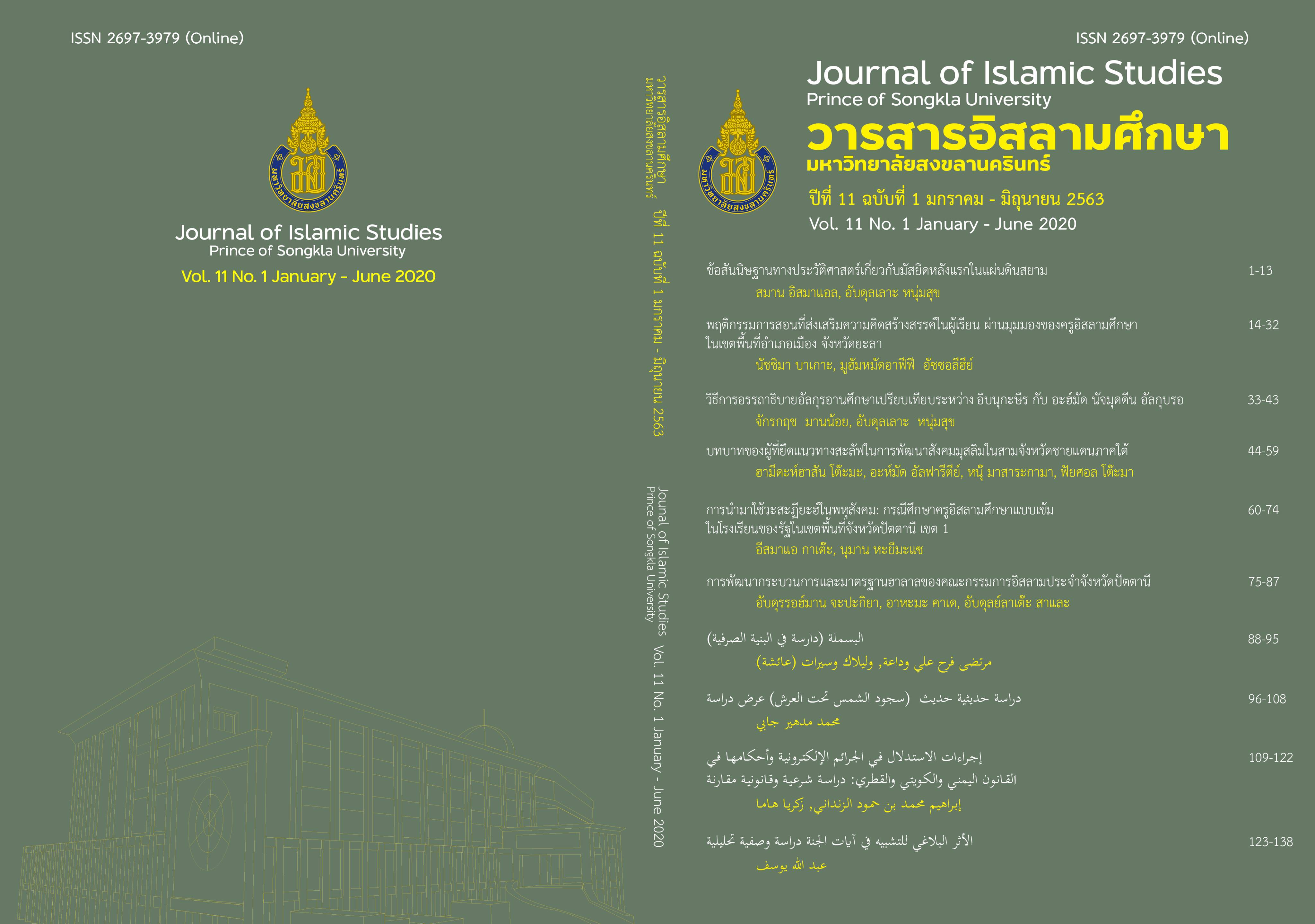The Role of Salaf People in the Development of Muslim Society in the Three Southern Border Provinces
Keywords:
Role, Salaf, Social Development, Three Southern Border ProvincesAbstract
The objectives of this research were to study 1) the theory and the ideology of Salaf in brief, 2) the history of the Salaf approach in the three southern border provinces, and 3) the development of the Muslim society for those who adhere to the Salaf ideology in the three southern border provinces. This research is a qualitative research consisting of data, documents, and field work. Which has a sample group of 45 people from the three southern border provinces, each province with 15 people. The tool using in this research consist of in-depth interviews structured, participatory observation and small group discussion and calculated using descriptive data analysis. The results of the research were as follows: 1) in the language, word Salaf means the previous generation referring to those of Ulama who have inherited the inheritance from the Prophet Muhammad. Which has existed during the first three centuries of Hijra and the Prophet confirmed that these people are of great value, which use the Qur’an and Al-Hadith verses as evidence for reference before intellectual evidence to seize the understanding of the Sahabah, tabi’in tabi' al-tabi'in and contemporary Muslim scholars who follow the Salaf ideology etc. 2) This Salaf ideology has approach to the southern border provinces starting from Bangkok and gradually into Pattani province around the year 1943, and 3) those who take the Salaf ideology using different forms to develop the Muslim society such as to establish educational institutions at all levels and build more mosques that ready to revive and establish a place to live and care for orphans, build a comprehensive Islamic cooperative in all provinces in the southern region. Thai
Muslims giving an importance to education in both religion and academic at the same time, and Thai Muslim women dress appropriately according to religious principles etc.
References
ซุฟอัม อุษมาน และคณะ. (2547). ขบวนการวะฮาบีย์นิยามและความหมาย. กรุงเทพฯ : อิสลามิคอะเคเดมี.
ฝ่ายกองการศึกษา. (2554). มูลนิธิอัล-ฟุรอนเพื่อการศึกษาและสังคมสงเคราะห์. วารสารอัล-ฟุรกอน 1 (2), 25-30.
มหาวิทยาลัยอิสลามยะลา. (2554). เนื่องในโอกาสจัดพิธีมอบปริญญารัฐประศาสนศาสตร์ดุษฎีบัณฑิตกิตติมศักดิ์ แด่ Y.A.Bhg.Tun Dr.Mahadhir Bin Mohamad มหาธีร์ โมหัมมัด. วารสารเพื่อการประชาสัมพันธ์. มหาวิทยาลัยอิสลามยะลา. 13(15), 4-5.
มูหะมัด คอยา. (2550). บทบาทมัสยิดในจังหวัด ปัตตานีในการเผยแผ่อิสลามและความรู้ กรณีศึกษามัสยิดอิบาดุรรอฮ มาน ตำบลปูยุดอำเภอเมือง จังหวัดปัตตานี (วิทยานิพนธ์ศิลปศาสตร์มหาบัณฑิต). มหาวิทยาลัยสงขลานครินทร์, วิทยาเขตปัตตานี: ปัตตานี.
วินัย ครุวรรณพัฒน. (2523). ทัศนะของคนไทยใน 4 จังหวัด ภาคใต้. (รายงานการวิจัย) ม.ป.ท.
วิมลชัย คำปุ้ย และทัดดาว ลออโรจน์วงศ์. (2536). บทบาทของผู้นำอาสาพัฒนาชุมชนในทัศนะของข้าราชการในระดับตำบล. (รายงานการวิจัย). กองวิชาการและแผนงาน กรมการพัฒนาชุมชน กระทรวงมหาดไทย.
สมาคมนักเรียนเก่าอาหรับประเทศไทย.ฮ.ศ. (1419). พระมหาคัมภีร์อัลกุรอานพร้อมความหมายภาษาไทย. อัลมะดีนะฮฺ อัลมุเนาวะเราะฮฺ: ศูนย์กษัตริย์ฟะฮัดเพื่อการพิมพ์อัลกุรอาน.
เสริมศักดิ์ วิศาลาภรณ์และคณะ. (2552). สภาพการจัดการศึกษาในจังหวัดชายแดนภาคใต้.(รายงานการวิจัย) กรุงเทพฯ : สำนักงานเลขาธิการสภาการศึกษา.
อาหามะกอซี กาซอ. (2547). การปฏิรูปสังคมของเคาะลีฟะฮฺอุมัรฺ อิบนุ อัลอะซีซ (วิทยานิพนธ์ศิลปศาสตร์มหาบัณฑิต). มหาวิทยาลัยสงขลานครินทร์, วิทยาเขตปัตตานี: ปัตตานี.
อาหะมะ หะยีสะมะแอ. (2549). บทบาทสถาบันการศึกษาอิสลามชั้นสูงในการเผยแพร่วิทยาการและส่งเสริมวัฒนธรรมความรู้ต่อชุมชนใน จังหวัดชายแดนภาคใต้ ศึกษาโครงการวิทยาการอิสลามเพื่อชุมชน (เค้าโครงวิทยานิพนธ์ศิลปศาสตร์มหาบัณฑิต). มหาวิทยาลัยอิสลามยะลา.
อัชชาฟิอีย์, มุหัมมัด อิดรีส. (1980). อัรริสาละฮฺ. (เล่ม 2). เบรุต : ดาร์ อัลกุตุบ อัลอิลมียะฮ์.
อัตติรมีษีย์, อบี อีซา มุหัมมัด บิน อีซา บิน ษัรฺวะฮฺ. (1994). สุนัน อัตติรมีษีย์. (เล่มที่.4). เบรุต : ดาร์ อัลฟิกร์.
อัตตะมีมีย์, ตะกียุดดีน อะห์มัด. (1996). มัจญ์มูอะฮฺ อัลฟัตวา. อัรริยาฎ: อัละบีกาน.
อัลกุวัยศีย์. (2002). อัรรอด์ อะลา ยะฮฺมียะฮฺ วะ อัซซะนาดีเกาะฮฺ. ม.ป.พ.
อัลบุคอรีย์, อบี อับดุลลอฮฺ มุหัมมัด บิน อิสมาอีล. (1997). เศาะหีหฺ อัลบุคอรีย์. (เล่มที่ 14). อัรริยาฏ : ดาร์ อัสสะลาม.
อัลมัสอูดีย์, อบี อัลหะสัน อะลี บิน หุสัยน์ บิน อะลีย์. (ม.ป.ป). มุรูจญ์ อัษษะฮับวะ มะอาดิน อัลเญาฮัร์. (เล่ม 2). เบรุต: อัลมักตะบะฮฺ อัลอัศรียะฮฺ.
อัลอักลฺ, นาศิรฺ บิน อับดุลการีม. (1998). อัลเคาะวาริจญ์ เอาวัล อัลฟิรอก ฟิ อัตตารีค อัลอิสลาม.อัรริยาฎ: ดาร์ อัลวะฏอน.
อัลอุษัยมีน, เชค มุหัมมัด บิน ศอลิหฺ (2010). หลักความเชื่อของมุสลิม. ซุฟอัม อุษมาน, (ผู้แปลและเรียบเรียง). ม.ป.พ.
อิบนุ ตัยมียะฮฺ. (1980). กิตาบ อัซซิยาเราะฮฺ. เล่มที่ 14. เบรุต : อัลมักตะบะฮฺ อัลหะยะฮ์.
อิบนุ มันซูรฺ, มุหัมมัด บิน มุกรอม บิน อาลี บิน อะห์มัด อันนะศอรีย์. (ม.ป.ป). ลิสาน อัลอาหรับ. เล่มที่ 3 .ไคโร : ดาร์ อัลมะอารีฟ.
ฮามีดะห์ มาสาระกามาและคณะ. (2554). บทบาทมัจญลีส อัลอิลมีย์ในการพัฒนาคุณธรรมจริยธรรมและคุณภาพชีวิตชาวไทยมุสลิมในสามจังหวัดชายแดนภาคใต้. (รายงานการวิจัย). กรุงเทพ : สำนักงานคณะกรรมการอุดมศึกษา.
Dagor-ha, Nurdin Abdullah (1997). Dakwah Islamiyah di Selatan Thailand : suatu Kajian Tentang perkembangannya Antara Tahun 1960-1991 masihi. Kuala Lumpur: University Malaya.
Downloads
Published
How to Cite
Issue
Section
License
Copyright (c) 2020 Journal of Islamic Studies, Prince of Songkla University

This work is licensed under a Creative Commons Attribution 4.0 International License.
All articles Published in The Journal of Islamic Studies are author’s opinions, and not the responsibility of the Faculty of Islamic Sciences nor the editorial board. However any citation should be referred to the journal.
















